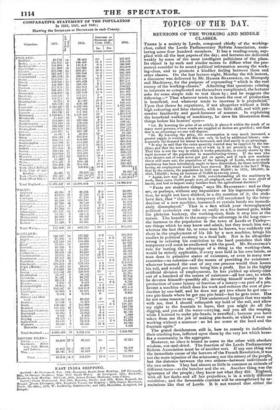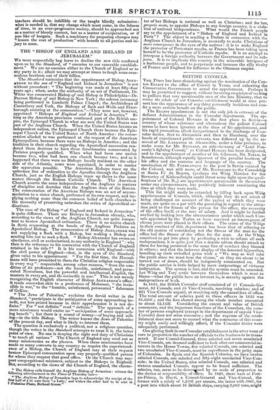TOPICS OF THE DAY.
REUNIONS OF THE WORKING AND MIDDLE CLASSES.
THERE is a society in Leeds, composed chiefly of the working'. clue, called the Leeds Parliamentary Reform Association, num- bering some four hundred members. It has a reading-room, sup- plied with all the best papers of the day; and lectures are delivered weekly by some of the most intelligent politicians of the place. Its object is by' such and similar means to diffuse what the pro- moters consider to be sound political information among the work- ing-class, and to promote a kindlier feeling between them and other classes. On the last lecture-night, Monday the 8th instant, a discourse was delivered by Mr. HAMER &mama), on Monopoly and Machinery, for the purpose of expounding " which is the real enemy of the working-classes." Admitting that questions relating to interests so complicated are themselves complicated, the lecturer asks for some simple rule to test them by ; and he suggests the following-" That whatever tends to lessen the cost of production is beneficial, and whatever tends to increase it is prejudicial" IJPon that theme he expatiates, if not altogether without a little high colouring and false rhetoric, with no little skill, and with per- suasive familiarity and good-humour of manner. In explaining the beneficial working of machinery, he drew his illustration from things before his hearers' eyes-
" 1st. By lowering the price of an article, it places it within the reach of to many more persons, whose wants are supplied or desires are gratified ; and that this is an advantage no one will dispute. "2d. By lowering the price the consumption is very much increased; a greater supply is wanted, and this can only be had by additional labour; con- sequently the demand for labour is increased, and that surely is an.advantage.
"It may be said that the extra quantity wanted may be supplied by the ma- chine, and that the men thrown out of work by it are precisely as they were. That this is not the way in which'it works practically, is clearly shown by the
rapid increase of the populatioq in manufacturing-towns. If the men who were thrown out of work never got put on again, and if each new machine threw still more out, the population of the borough of Leeds, where so math machinery has been introduced, ought to have diminished, for those individuals having no employment would have been starved. But what is the fact ? Why, that by the census, the population in 1821 was 80,000; in 1831, 120,000; in 1841, 150,000; being an increase of 70,000 in twenty years.
" Again, how was it that in 1836, notwithstanding all the machinery in work, these extra 70,000 people were all employed, and that we were short of hands, and had to import many families from the agricultural districts?"
"Facts are stubborn things," says Mr. STANSEBLD : and so they are, or perhaps, without any imputation on his, ingenuous disposi-
tion, he might not have shirked, in a dry mention of it, the stub- born fact, that "there is a temporary evil occasioned by the intro- duction of a new machine, inasmuch as certain hands are immedi- ately disemployed." That is a fact which your thoroughpaced political economist can take as easily as a five-barred gate, while the plebeian hackney, the working-man, finds it stop him at the outset. The benefit to the many-the advantage in the long-run- the increase to the population in the town of Leeds or Paisley- are things which he may know and admit, but they touch him not; whereas the fact that he, or some man he knows, was suddenly cut
short in the employment of his life by a new machine, brings his studies in political economy to a dead halt. Nor is he altogether
wrong in refusing his conviction to the bard postulate that this
temporary evil must be swallowed with the good. Mr. STANSPELD'S rule for testing, the advantage of a thing to the working-class,
would be strictly applicable, if every man held in his own hands, as man does in primitive states of existence, or even in many new countries-as colonies---all the means of providing for existence :
whatever lessened the cost of any one process would then lessen his toil, and would pro tanto bring him a profit. But in the highly artificial division of employments, he has yielded up ninety-nine
out of a. hundred of the means of existence-all but one to which he devotes himself-possibly all; devoting himself merely to the production of some luxury or fraction of a luxury-as part of a pin.
Invent a machine which does his work and reduces the cost a pro-
duction by one-half, and he does not get two where he got one- two pin-heads where he got one pin-head-but he gets none. Has he not some reason to say, This understood bargain that was made with me, that I should relinquish my hold of the soil, and allow my right to the fountain to lapse, that you might do all the
digging, and you all the water-carrying, and you all the reaping, while I learned to make pin-heads, is -annulled ; because you have taken from me the job of making phi-heads, at which I went on working without a murmur : so let me come at the land and the fountain again." The grand desideratum still is, how to remedy to individuals their crushing loss, inflicted upon them by the very act which bene- fits a community in the aggregate. However, no class is bound to come to the other with absolute wisdom' cut-and-dried. The function of the Leeds Parliamentary
Reform Association must be of another sort. If any one thing was the immediate cause of the horrors of the French Revolution, it was not the mere injustice of the aristocracy nor the misery of the people, but the distance between the two orders---between individuals of
the two orders. They had almost as little in common as animals of different races-as the butcher and the ox. Another thing was the ignorance of the *Pie r they knew not what they did. -England, with all her faults and all her prejudiees, is in a Widely different condition ; and the favourable contrast will be strengthened by as- sociations like that of Leeds. It is not wanted that either the
teachers should be infallible or the taught blindly submissive : what is needed is, that any change which must come, in the fulness of time, in an ever-progressive society, should be approached not as a matter of bloody contest, but as a matter of cooperation, or if you like of bargain. Such a machinery for preparing changes may "lessen the cost of production" with benefit to all parties and in- jury to none.



























 Previous page
Previous page